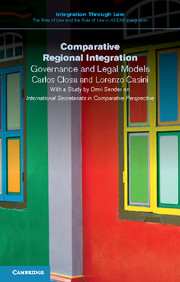Book contents
- Frontmatter
- Contents
- List of figures
- List of tables
- General editors’ preface
- Preface
- List of abbreviations
- Chapter 1 Governance structures and processes in integration organizations
- Chapter 2 The development of international legal regimes
- Study Lead, follow or get out of the way? International secretariats in comparative perspective
- Executive summary
- Index
General editors’ preface
Published online by Cambridge University Press: 05 August 2016
- Frontmatter
- Contents
- List of figures
- List of tables
- General editors’ preface
- Preface
- List of abbreviations
- Chapter 1 Governance structures and processes in integration organizations
- Chapter 2 The development of international legal regimes
- Study Lead, follow or get out of the way? International secretariats in comparative perspective
- Executive summary
- Index
Summary
This monograph is published within the context of a wide-ranging research project entitled, Integration Through Law: The Role of Law and the Rule of Law in ASEAN Integration (ITL), undertaken by the Centre for International Law at the National University of Singapore and directed by J. H. H. Weiler and Tan Hsien-Li.
The Preamble to the ASEAN Charter concludes with a single decision: “We, the Peoples of the Member States of the Association of Southeast Asian Nations. [h]ereby decide to establish, through this Charter, the legal and institutional framework for ASEAN.” For the first time in its history of over four decades, the Legal and the Institutional were brought to the forefront of ASEAN discourse.
The gravitas of the medium, a Charter: the substantive ambition of its content, the creation of three interlocking Communities, and the turn to law and institutions as instruments for realization provide ample justification for this wide-ranging project, to which this monograph is one contribution, examining ASEAN in a comparative context.
That same substantive and, indeed, political ambition means that any single study, illuminating as it may be, will cover but a fraction of the phenomena. Our modus operandi in this project was to create teams of researchers from Asia and elsewhere who would contribute individual monographs within an overall framework which we had designed. The project framework, involving several thematic clusters within each monograph, is thus determined by the framework and the place of each monograph within it.
As regards the specific content, however, the authors were free, indeed encouraged, to define their own understanding of the problem and their own methodology and reach their own conclusions. The thematic structure of the entire project may be found at the end of this Preface.
The project as a whole, and each monograph within it, display several methodological sensibilities.
First, law, in our view, can only be understood and evaluated when situated in its political and economic context. Thus, the first studies in the overall project design are intended to provide the political, economic, cultural and historical context against which one must understand ASEAN and are written by specialists in these respective disciplines.
- Type
- Chapter
- Information
- Comparative Regional IntegrationGovernance and Legal Models, pp. xv - xxPublisher: Cambridge University PressPrint publication year: 2016



